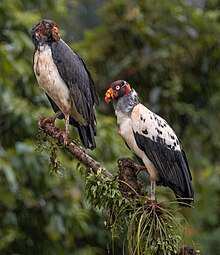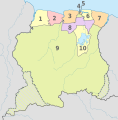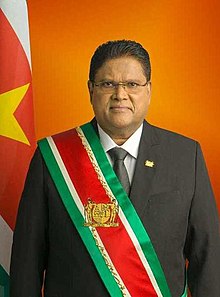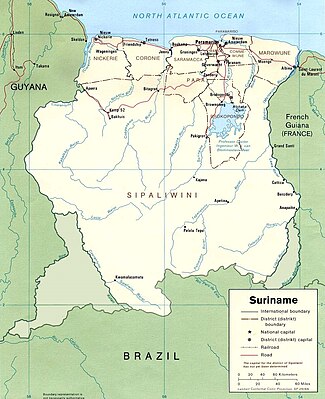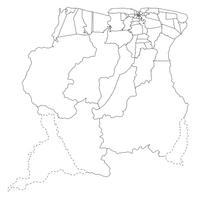The Suriname portal
Suriname (/ˈsʊərɪnæm, -nɑːm/ SOOR-in-A(H)M, Dutch: [syːriˈnaːmə] , Sranan Tongo: [sraˈnãŋ]), officially the Republic of Suriname (Dutch: Republiek Suriname [reːpyˈblik syːriˈnaːmə]), is a country in northern South America, sometimes considered part of the Caribbean and the West Indies. Suriname is a developing country with a medium level of human development; its economy is heavily dependent on its abundant natural resources, namely bauxite, gold, petroleum, and agricultural products. Suriname is a member of the Caribbean Community (CARICOM), the United Nations, and the Organisation of Islamic Cooperation. Situated slightly north of the equator, over 90% of its territory is covered by rainforests, the highest proportion of forest cover in the world. Suriname is bordered by the Atlantic Ocean to the north, French Guiana to the east, Guyana to the west, and Brazil to the south. It is the smallest country in South America by both population and territory, with around 612,985 inhabitants in an area of approximately 163,820 square kilometers (63,251 square miles).0 The capital and largest city is Paramaribo, which is home to roughly half the population. Suriname was inhabited as early as the fourth millennium BC by various indigenous peoples, including the Arawaks, Caribs, and Wayana. Europeans arrived and contested the area in the 16th century, with the Dutch controlling much of the country's current territory by the late 17th century. Under Dutch rule, Suriname was a lucrative plantation colony focused mostly on sugar; its economy was driven by African slave labour until the abolition of slavery in 1863, after which indentured servants were recruited mostly from British India and the Dutch East Indies. In 1954, Suriname became a constituent country of the Kingdom of the Netherlands. On 25 November 1975, it became independent following negotiations with the Dutch government. Suriname continues to maintain close diplomatic, economic, and cultural ties with the Netherlands. Suriname's culture and society strongly reflect the legacy of Dutch colonial rule. It is the only sovereign nation outside Europe where Dutch is the official and prevailing language of government, business, media, and education; an estimated 60% of the population speaks Dutch as a native language. Sranan Tongo, an English-based creole language, is a widely used lingua franca. Most Surinamese are descendants of slaves and indentured labourers brought from Africa and Asia by the Dutch. Suriname is highly diverse, with no ethnic group forming a majority; proportionally, its Muslim and Hindu populations are some of the largest in the Americas. Most people live along the northern coast, centered around Paramaribo, making Suriname one of the least densely populated countries on Earth. (Full article...) Selected article -The king vulture (Sarcoramphus papa) is a large bird found in Central and South America. It is a member of the New World vulture family Cathartidae. This vulture lives predominantly in tropical lowland forests stretching from southern Mexico to northern Argentina. It is the only surviving member of the genus Sarcoramphus, although fossil members are known. Large and predominantly white, the king vulture has gray to black ruff, flight, and tail feathers. The head and neck are bald, with the skin color varying, including yellow, orange, blue, purple, and red. The king vulture has a very noticeable orange fleshy caruncle on its beak. This vulture is a scavenger and it often makes the initial cut into a fresh carcass. It also displaces smaller New World vulture species from a carcass. King vultures have been known to live for up to 30 years in captivity. (Full article...) General imagesThe following are images from various Suriname-related articles on Wikipedia.
Selected biography -Chandrikapersad "Chan" Santokhi (Dutch: [tɕɑnˈdrikaːpɛrˌsɑt sɑnˈtɔki]; Sarnami: चंद्रिकापेर्साद सांतोखी, pronounced [cⁿd̪rikɑːpərəsɑːd̪ə sⁿt̪oːkʰiː]; born 3 February 1959) is a Surinamese politician and former police officer who is the 9th president of Suriname, since 2020. After winning the 2020 elections, Santokhi was the sole nominee for president of Suriname. On 13 July, Santokhi was elected president by acclamation in an uncontested election. He was inaugurated on 16 July. (Full article...) Selected pictureMapTopics
CategoriesRelated portalsThings to do
WikimediaThe following Wikimedia Foundation sister projects provide more on this subject:
SourcesDiscover Wikipedia using portals | ||||||||||||||||||||||||||||||||||||||||||||||||||||||||||||||



